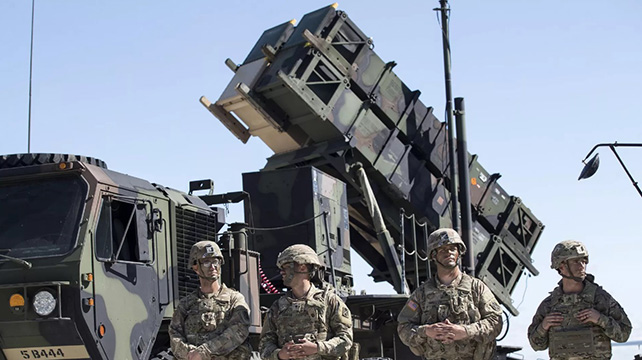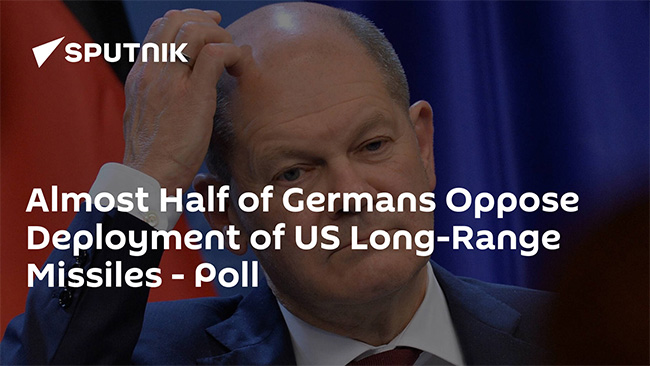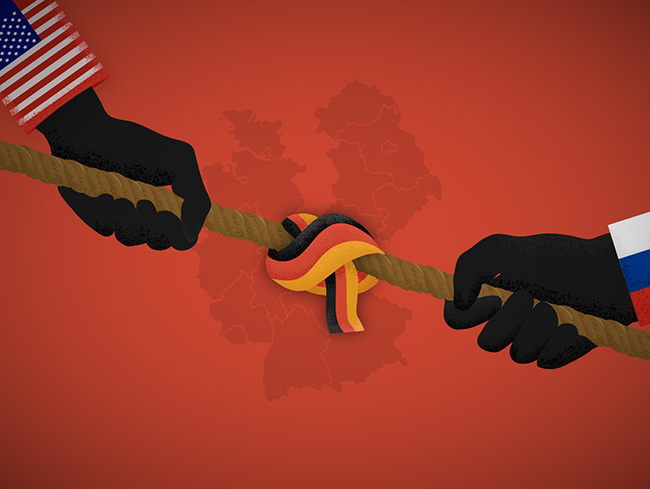 Photo: AP
Photo: AP
Sources told UK media that Britain has partnered up with Germany to develop and deploy a new intermediate-range missile designed to target Russia’s nuclear arsenal, ‘Sputnik Globe’ informs.
UK Defense Secretary John Healey spoke to his German counterpart in Berlin on Wednesday about a plan to jointly develop a new strategic missile with a 3,200 km range, The Times reported, citing sources said to be familiar with the idea.
Once developed and fielded, the new missiles would be deployed in Germany, according to the publication, replacing the American ground-based long-range fires that Washington recently announced would be stationed in the Central European country beginning in 2026.
Both the American missiles and the proposed new British-German missile would have been prohibited under the 1988 Intermediate-Range Nuclear Forces (INF) Treaty, which banned the development, production and deployment of ground-based missiles in the 500-5,500 km range. Washington violated the Treaty for years, according to Moscow, and unilaterally scrapped the agreement in 2019 and immediately began testing of new long-range weapons after falsely accusing Russia of possessing a ground-based missile system with a range beyond 500 km.
A joint declaration from Healey’s talks with his German counterpart, Boris Pistorius, mentioned a commitment to “undertake a long-term, comprehensive cooperation in the field of long-range capabilities” to provide “deep precision strike” potential. The details are reportedly still being worked out, with no additional information made available, besides the new missile’s expected role as a conventional fire designed to destroy enemy tactical nuclear delivery systems.
The Storm Shadow is currently the furthest-reaching conventional missile in Britain’s arsenal. It has a range of about 240 km, and has been deployed extensively by Ukraine in the NATO-Russia proxy war. The Taurus KEPD 350 is Germany’s longest-range missile system, and has a range of up to 500 km. Berlin has refused to send the air-launched weapon to Ukraine, expressing concerns that doing so would make Germany a “party to the war” because German troops would be on the ground training Ukrainians to use the missiles.
“The deployment of these missiles, both American and British, is connected to two things,” Alexei Leonkov, editor of Russia’s Arsenal of the Fatherland military affairs and technology magazine, told Sputnik, commenting on The Times piece.
“The first is the global concept, the strategy under which NATO has been restructuring toward since 2002, which is the Conventional Prompt Strike (CPS) concept, whose essence centers around the need to destroy the nuclear potentials of an adversary like Russia or China,” Leonkov said.
Thought up by the Bush administration, CPS envisions the mass deployment of thousands of conventional long-range missiles fired simultaneously in a massive surprise attack to destroy as much of an enemy’s strategic arsenal as possible, decapitate its leadership, and destroy remaining fired nuclear missiles using missile defenses.
The primary danger of the idea stems from the concern that it will make the prospect of a ‘limited’ nuclear war seem more palatable for Pentagon planners, and hence increasing the temptation to launch aggression.
The second reason for the British-German plan to develop a new missile centers around the fact that the Americans “are running late, or perhaps have lost the technologies used to create intercontinental missiles with a range beyond that of the Minuteman-3,” Leonkov argues.
“Why do the Americans want to switch up some of their missiles for European ones? I think that most likely, the missiles they have developed may not have proven entirely successful. Hence they’ve decided to attract a European consortium led by the UK.”
In fact, these new European weapons may be the mystery “developmental hypersonic weapons” that the White House mentioned in its press statement earlier this month when it announced the deployment of new long-range strike systems to Germany from 2026 onward, Leonkov said.

A new poll about a planned US missile deployment to Germany shows that more Germans are opposed to the idea than favor it.
The US recently announced that starting in 2026, it will be deploying missile systems that were previously banned by the Intermediate-Range Nuclear Forces (INF) Treaty, which prohibited land-based missile systems with a range between 310 and 3,400 miles.
The poll, conducted by the Forsa Institute, found that 49% of Germans think the new missile deployment is “not right,” while 45% support the idea. Opposition is stronger among Germans living in states that used to be East Germany, with 74% of them against the plan.
The US announced the deployment in a joint statement with Germany, but German Chancellor Olaf Scholz is facing opposition to the plan from within his own party and coalition government.
“Not every weapon makes Germany immediately safer,” Rolf Mützenich, the parliamentary leader of Scholz’s Social Democratic Party (SDP), told POLITICO. Mützenich previously warned that the “danger of an unintentional military escalation is considerable.”
Senior members of the SDP who are concerned about the deployment said they would call a debate about it in September. “The current debate surrounding the announced stationing of long-range conventional weapons systems in Germany concerns us all,” they said in a note seen by POLITICO.
The US announced its deployment would include Tomahawk missiles, which are nuclear-capable and have a range of over 1,000 miles. Tomahawks are typically used on US Navy destroyers and submarines since a land-based version was banned by the INF.
The US also said it will send SM-6 missiles to Germany, which signals it’s planning to deploy a Typhon missile system. The Typhon is a covert system concealed in a 40-foot shipping container that can fire Tomahawks and SM-6 missiles. The SM-6 can hit targets up to 290 miles away, below the levels previously banned by the INF.
Russian President Vladimir Putin has vowed Russia will respond to the deployment by ending its moratorium on deploying missiles previously banned by the INF. Russian Deputy Foreign Minister Sergey Ryabkov said he wouldn’t rule out the idea of Moscow deploying nuclear-armed missiles in response.
 Pic.: ‘Neue Zürcher Zeitung’
Pic.: ‘Neue Zürcher Zeitung’
«The fact that Chancellor Olaf Scholz had to ask the US to deploy medium-range weapons in Germany is an admission of failure by his predecessor,» writes Eric Guyer, editor-in-chief of the ‘Neue Zürcher Zeitung’.
Chancellor Merkel's reluctance to invest in defense has left the country a «ball» between the US and Russia. For not to anger Washington, Berlin will have to unconditionally participate in all US initiatives against China, including sanctions and higher customs duties. «That would be a disaster for the German export industry,» Guyer insistes.
The conflict in Ukraine has also exacerbated the East-West divide in Germany. «Culturally and politically, different parts of the country are on different paths, and the war is deepening the division, since East and West Germans have very different views on Russia and NATO.» The ‘Neue Zürcher Zeitung’ editor-in-chief is worried about the popularity of the ‘Alternative for Germany’ and the ‘Wagenknecht party’ in the East of the country. According to polls, both parties will receive more than 50% of the votes in the upcoming state elections. Eric Guyer believes that this will undermine Germany as a reliable support for the EU in the long term.
He sees the reason for the political split in Germany, in particular, as Berlin's inability to effectively replace Russian gas, while simultaneously abandoning nuclear power plants. «The ideological nature of energy policy is another security risk,» Guyer believes.
«Today, Germany is militarily weak, polarized between East and West, and economically more vulnerable than ever before,» Eric Guyer concludes. The country is still the leader of the EU, «one of the pillars of support for Ukraine,» but it is clear to the naked eye «how Berlin's position is weakening.»
…A meaningful photo. Chancellor Scholz and his delegation lay down in fear on the Ben Gurion Airport runway in Israel when some kind of danger arose, which turned out to be false.
The main thing is to lie quietly!

read more in our Telegram-channel https://t.me/The_International_Affairs

 11:25 05.08.2024 •
11:25 05.08.2024 •






















